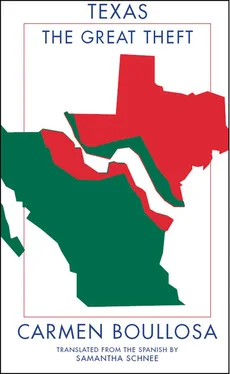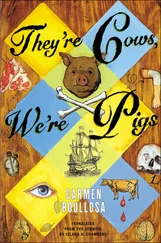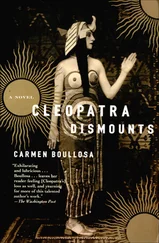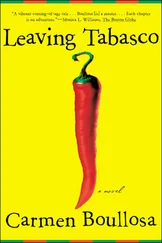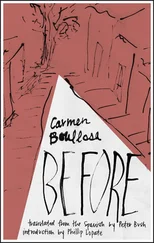The Fears don’t show the least interest (the minister is too prudent, and Eleonor is wrapped up in her own world) but Moonbeam is captivated. She knows how stupid Sheriff Shears is — he came to fix the Smiths’ dining room table and left it even wobblier than before — and she thinks the world of handsome Nepomuceno (the Smiths’ daughter Caroline carries a torch for him, and Moonbeam does a little too, like all the young girls in Bruneville).
When Minister Fear closes the door, Olga turns and heads back to the market. Moonbeam glances up and down Elizabeth Street, looking for a reason not to go back inside the Smiths’ and finish her chores, when around the corner come Strong Water and Blue Falls, two Lipans — the Lipans are fiercer than most Indians, but friendly with the gringos — astride two handsome mounts, followed by a heavily loaded pinto mustang, a typical prairie horse (if someone offers a good price, it’s for sale).
Strong Water and Blue Falls are turning onto James Street to avoid Nepomuceno’s men; they haven’t come to Bruneville looking for trouble.
Despite the heat, the Lipans are in long, fitted sleeves with bright, colorful stripes, and they’re wearing embroidered moccasins. They have bands of colored beads tied around their foreheads and their necks; their long hair is adorned with feathers, leather strips, and rabbit tails; and they have embossed spurs.
Neither too slowly nor too quickly — she knows what she’s doing, the street’s her territory — Moonbeam approaches them. The Lipans dismount. Moonbeam mimes what has just happened in the Market Square, using the same gestures as Olga. Then she turns and goes back inside the Smiths’ house, slamming the door, which prevents her from hearing the second shot of the morning.
Strong Water and Blue Falls interpret the Shears-Nepomuceno incident in different ways. Strong Water thinks it means something has happened at the Lipan camp, and he wants to return immediately because this bodes ill for his people. Blue Falls, on the other hand, thinks it has nothing to do with the Lipans; he’s certain the only thing they should worry about is selling their wares according to the orders of Chief Little Rib, and besides, the shaman, being omniscient, will already know all about the incident.
Should they head home, like Strong Water urges, or stay and sell their goods, like Blue Falls wants? Nothing they have with them is perishable — Strong Water argues that skins, nuts, and rubber sap will keep for weeks. But the trip is long and tiring, says Blue Falls, and they need munitions back at camp; the two shotguns they plan to buy are not urgent purchases, but they would come in handy on the way home; they had to take many detours to avoid danger on the road to Bruneville, and it would be better to return armed.
The Lipans defend their points of view, arguing ever more vehemently. They start fighting. Strong Water pulls his knife.
Inside the Smiths’ home, lovely Moonbeam gets back to work, filling the bucket at the cistern to carry water to the kitchen.
Meanwhile, at the market, Sharp, the butcher, is roaring with laughter. “Nepomuceno! That cattle thief! Humiliated in public, in the Market Square! He had it coming!”
The label “cattle thief” requires explanation. Sharp believes the cow in question is his because he bought it, but Nepomuceno believes he is right to call it his own, because the animal was born and raised on (and bears the brand of) the ranch where he himself was born. “Sharp shouldn’t be so self-righteous,” he says, “because he knew perfectly well the cow was stolen, and the price he paid didn’t begin to compensate the value of such a heifer, he can peddle that argument somewhere else!” When word of what Nepomuceno was saying got around the Mrs. Big’s Hotel, Smiley said, “Does he think Sharp’s cow is his sister?!”
Sharp puts his knife on the chopping block, wipes his hands on his apron, and, without taking it off, strides over to the Plaza.
Let’s leave him there, because we should travel back in time to just before the Shears-Nepomuceno incident — to, say, 11:55 AM — to fill in some details that matter to us.
Roberto Cruz, the leather merchant whom everyone calls “Cruz,” has been waiting some time for the Lipans, watching the main road impatiently from his stall at the edge of the market. According to Cruz, the Lipan sell the highest-quality skins, and the best embroidered moccasins (which nobody buys besides some eccentric Germans), and incomparable leather leggings, which sell like hotcakes because the women can’t ride without them lest they chafe their private parts.
Two days earlier Cruz had bought a bunch of buckles and eyelets. Sitú, the kid who knows how to burn designs into belts (a new look that’s very popular), is waiting at home for the Lipans’ leather. Since the Lipan, like all prairie Indians, follow the lunar calendar, Cruz expects them shortly. If they don’t show up, Perla will start getting irritated because of Sitú sitting around, doing nothing, getting on her nerves. Perla is the girl who has kept house for him since his wife died and who he is determined to marry, as soon as his daughter gets hitched. He’s made up his mind though he hasn’t told anyone yet, not even her.
So there was Cruz, craning his neck, trying to spot the Lipans coming down Main Street, when Óscar passed by with his basket of bread on his head.
“Psst, Óscar, I’m talking to you! Gimme a sweet roll!”
“O.K., but only one per customer. I didn’t put much in the oven ’cause I thought it was going to be a slow day, and I have to hold on to enough to sell down at the docks.”
“O.K., just one.”
Cruz keeps craning his neck, scanning for the Lipans, while Óscar lowers his basket.
Óscar selects a crunchy bun covered with sugar (he knows what Cruz likes, it’s his favorite). Cruz pays him.
“Keep the change.”
“Nah, Cruz, you don’t have to do that.”
“Then put it toward my next bun.”
Óscar lifts the bread basket onto his head and leaves for the docks.
Tim Black comes out of Café Ronsard. He greets Cruz and gestures that he should bring over his belts. Tim Black is a wealthy Negro who, most unusually, owns land and slaves. When Texas gained its independence from Mexico in 1836 Negro landholders were disenfranchised when Texas’ Congress legalized slavery and imposed racial restrictions on owning property; Tim Black was granted an exemption from these laws by the new Congress.
Cruz puts his roll on the counter and slings a bunch of belts over his shoulder; they hang by their buckles from an iron hook in his hand.
At this moment, in the middle of the square Sheriff Shears shouts at Lázaro Rueda, the old vaquero , the one who knows how to play the violin, and whacks his forehead, hard, with the butt of his pistol. After the second or third blow, Lázaro falls to the ground.
Tim Black moves to see what’s happening. He doesn’t understand Spanish, which leaves him clueless about much that happens on the frontier, but no language is needed to know exactly what’s going on: a poor old man is being beaten senseless by the sheriff.
Nepomuceno exits Café Ronsard and he, too, encounters the scene with Shears. He recognizes Lázaro Rueda instantly and decides to intervene.
Black watches Nepomuceno’s reaction, hears his calm tone, catches the drift of his words — with the help of Joe Lieder, the German kid who repeats everything in his broken English — and hears the sharpness of Shears’ insulting response: “Shut up, you dirty greaser.”
The merchant ship Margarita ’s horn sounds, announcing her imminent departure.
On the other side of the square, Óscar hears the words Shears spits at Nepomuceno and sees out of the corner of his eye what’s happening, but his sense of duty is greater than his curiosity; if the Margarita has sounded her horn he barely has time to get down to the docks and if he doesn’t speed up they won’t get their bread. He hurries away.
Читать дальше
